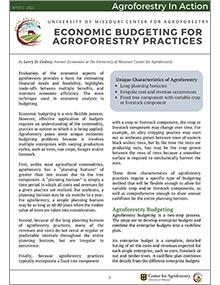

Economic Budgeting for Agroforestry Practices
Revised
See the steps and examples you can follow to develop enterprise budgets, create a cashflow plan and estimate economic indicators for agroforestry practices.
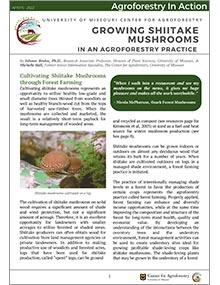
Growing Shiitake Mushrooms in an Agroforestry Practice
Revised
Cultivating shiitake mushrooms represents an opportunity to utilize healthy low-grade and small-diameter trees thinned from woodlots as well as healthy branch-wood cut from the tops of harvested saw-timber trees. When the mushrooms are collected and marketed, the result is a relatively short-term payback for long-term management of wooded areas.
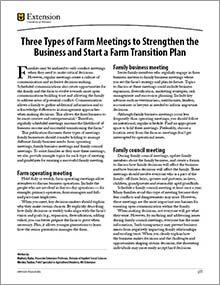
Three Types of Farm Meetings to Strengthen the Business and Start a Farm Transition Plan
New
Use operating, business and family council meetings to build a culture of communication and inclusive decision-making in your family business.

Tiger Card (Bundle of 50)
Reviewed $26
This promotional piece is intended for Family Nutrition Education Program employees to use as needed.
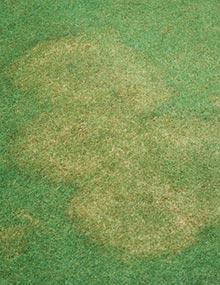
Identification and Management of Turfgrass Diseases, Page 05
Reviewed
Brown patch is a sheath- and leaf-blighting summer disease that is common on tall fescue and bentgrass. It is particularly severe on tall fescue. With increased use of tall fescue in urban and commercial landscapes, brown patch has become a significant management problem.
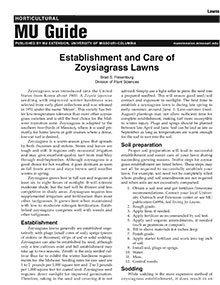
Establishment and Care of Zoysiagrass Lawns
Reviewed
Guide to establishing and maintaining zoysiagrass lawns, covering planting methods, soil prep, and care tips for a healthy, low-maintenance turf.
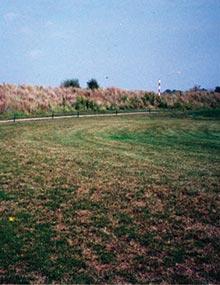
Identification and Management of Turfgrass Diseases, Page 08
Reviewed
Learn to identify and manage dollar spot, a common turfgrass disease affecting bentgrass and bluegrass, with symptoms, conditions, and control methods.
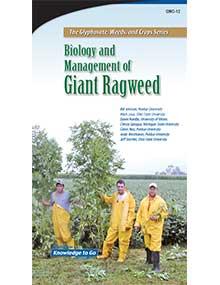
Biology and Management of Giant Ragweed
Reviewed
Editor’s note
The following abstract describes a publication that is only available as a downloadable PDF.
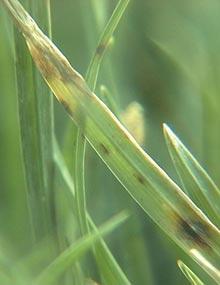
Identification and Management of Turfgrass Diseases, Page 11
Reviewed
Gray leaf spot, also called blast, occurs in most areas of the country where perennial ryegrass is grown. Disease development is sporadic with little or no disease development in some years. Nevertheless, the potential destructiveness of gray leaf spot forces many turfgrass managers to apply preventive fungicide applications every year.
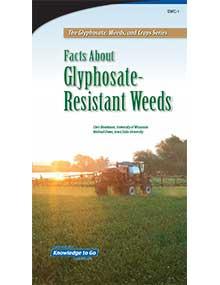
Facts About Glyphosate-Resistant Weeds
Reviewed
Editor’s note
The following abstract describes a publication that is only available as a downloadable PDF.
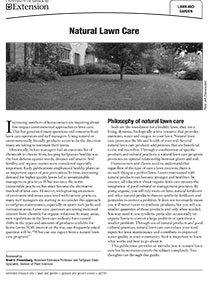
Natural Lawn Care
Reviewed
Learn lawn care practices that promote soil health, reduce the need for synthetic products, and improve water quality for a healthier, eco-friendly lawn.
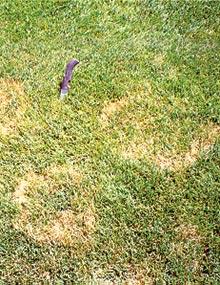
Identification and Management of Turfgrass Diseases, Page 14
Reviewed
Rhizoctonia zeae forms pink to orange bulbils (resting structures). The fungus has been observed with increasing frequency since the early 2000s.
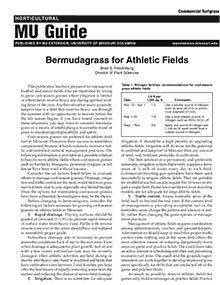
Bermudagrass for Athletic Fields
Reviewed
Bermudagrass offers a durable turf solution for athletic fields facing challenges with cool-season grasses due to limited irrigation and heavy use.
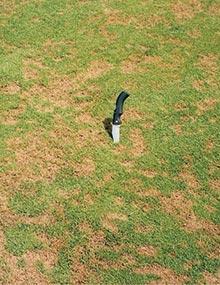
Identification and Management of Turfgrass Diseases, Page 17
Reviewed
Pythium foliar blight is one of the most feared turfgrass diseases, because the disease develops rapidly during periods of high temperature and high relative humidity. If left untreated, extensive loss of turf can occur in a few days.
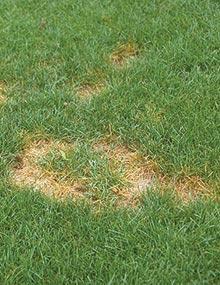
Identification and Management of Turfgrass Diseases, Page 20
Reviewed
Summer patch, sometimes referred to as frogeye patch, is a destructive disease of Kentucky bluegrass maintained for golf course fairways, green surrounds, parks and residential landscapes
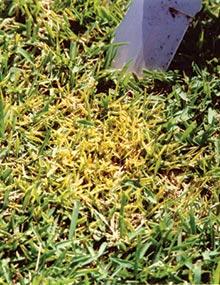
Identification and Management of Turfgrass Diseases, Page 23
Reviewed
Yellow tuft is a cool-season disease that is commonly observed on creeping bentgrass and intensively managed Kentucky bluegrass.
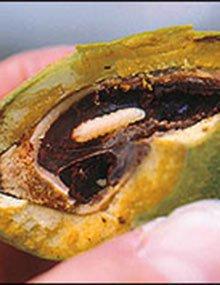
Pecan Pest Management: Insects and Diseases
Reviewed
This guide details pecan insect pests and diseases that can cause economic losses to Missouri producers.
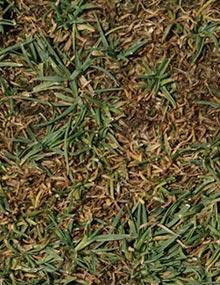
Identification and Management of Turfgrass Diseases, Page 03
Reviewed
Guidelines on managing turfgrass diseases, focusing on key prevention strategies such as proper fertilization, mowing, and fungicide use.
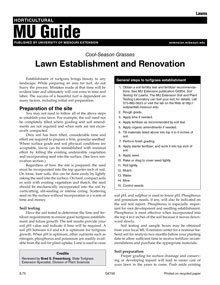
Cool-Season Grasses: Lawn Establishment and Renovation
Reviewed
Learn how to successfully establish or renovate cool-season grass lawns with proper soil preparation, seeding techniques, and essential fertilization steps.
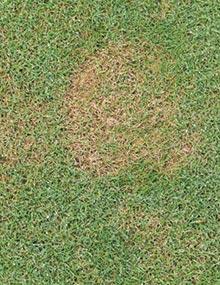
Identification and Management of Turfgrass Diseases, Page 06
Reviewed
Copper spot is a foliar disease of bentgrass, with severest outbreaks occurring on velvet bentgrass. It also occurs sporadically on creeping bentgrass greens and higher cut creeping bentgrass tees and fairways. Gloeocercospora sorghi causes a leaf spot of bermudagrass and zoysiagrass as well.
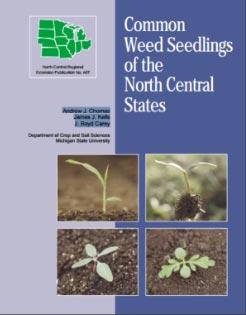
Common Weed Seedlings of the North Central States
Reviewed
Editor’s note
The following abstract describes a publication that is available for purchase from Michigan State Extension. To order this publication, please visit the MSU Extension Bookstore.
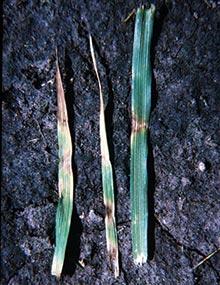
Identification and Management of Turfgrass Diseases, Page 09
Reviewed
Drechslera diseases are part of a group of diseases caused by fungi that were once cataloged in the genus Helminthosporium. Over the years, taxonomists have revised the genus Helminthosporium to include the genera Drechslera, Marielliotta, Bipolaris and Exserohilum. This section covers the diseases Drechslera leaf spot and melting-out caused by D. poae and red leaf spot caused by D. erythrospila.
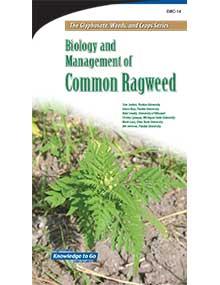
Biology and Management of Common Ragweed
Reviewed
Editor’s note
The following abstract describes a publication that is only available as a downloadable PDF.
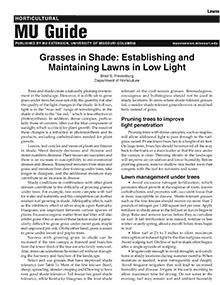
Grasses in Shade: Establishing and Maintaining Lawns in Low Light
Reviewed
Learn how to establish and maintain healthy lawns in shaded areas, including grass selection, tree pruning, and proper lawn care techniques.
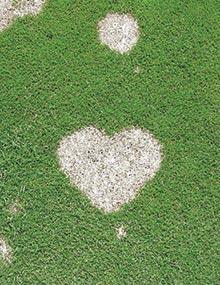
Identification and Management of Turfgrass Diseases, Page 12
Reviewed
Gray snow mold is a winter turfgrass disease in regions where snow cover persists for long periods. All grasses can be damaged to some extent, but injury is often more severe on annual bluegrass and bentgrass putting greens.